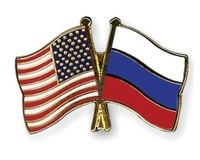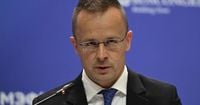Hungarian Foreign Minister Peter Szijjarto recently criticized the European Union for what he describes as "double standards" regarding Ukraine's potential membership in the bloc. Speaking at a joint press conference in Budapest with North Macedonian foreign minister Timcho Mucunski, Szijjarto argued that while the EU pushes for Ukraine to join before the Western Balkan countries, this approach is fundamentally flawed. He asserted that acceding to the EU would be detrimental for both the Union and global stability, reinforcing a division in priorities within Europe.
Szijjarto underscored that the integration of Ukraine should not occur until the Western Balkan nations are granted membership, claiming that accepting Ukraine before them would "destroy the functioning of the bloc from an economic and security point of view." He further stated, “no one can believe that Ukraine is in a better state today than any of the Western Balkan countries,” making a case that the latter are more ready for such an advancement.
In a notable declaration, he promised that the Hungarian public will have a chance to express their views on this contentious issue in a forthcoming referendum. This announcement underlines the Hungarian government's stance of prioritizing national interests and opinions regarding enlargement policies. Szijjarto insists that the EU's current approach to Ukraine is fundamentally misguided, as he believes the conditions for accession are not yet met.
Moreover, he pointed out that the case of North Macedonia exemplifies the unfair treatment some countries receive within the EU's candidacy framework. He highlighted that despite being an EU candidate for two decades, North Macedonia's progress has often been stalled by certain EU member states, adding that, “some EU governments are constantly blocking the progress of the integration process.” By drawing this comparison, Szijjarto's remarks reflect a broader frustration with the perceived inequities in the EU’s enlargement protocols.
He also addressed the Hungarian position concerning the rights of ethnic Hungarians in Transcarpathia, a region that has become a focal point of debate surrounding Ukraine's EU aspirations. Szijjarto emphasized that until Ukraine restores the previously acquired rights of Hungarians in that region, it would be unreasonable to expect the country to advance in its negotiations for EU membership. This sentiment echoes broader concerns within Hungary about the treatment of ethnic minorities and their rights in the context of national discussions about EU integration.
By framing the EU's actions as selective and inconsistent, Szijjarto calls for a more equitable approach that would respect the rights and readiness of all candidate countries irrespective of their geopolitical significance.
As the dialogue around Ukraine's EU membership continues, Hungary's domestic politics will play a crucial role in shaping the trajectory of these discussions. The referendum Szijjarto mentioned can further complicate the EU's enlargement agenda, as it indicates that members of the bloc might have differing priorities. Thus, the interplay between national interests and collective EU policies remains a vital area of concern for policymakers.
Moving forward, the EU will face pressure not only from its member states but also from a complex landscape of international relations where national identity, historical grievances, and economic implications collide. Szijjarto's comments represent a significant segment of concern within the EU about maintaining cohesion and a united front in the response to prospective EU membership by countries at varying stages of preparedness.





